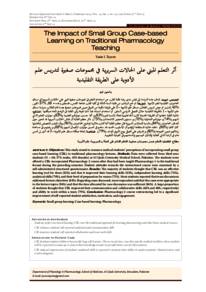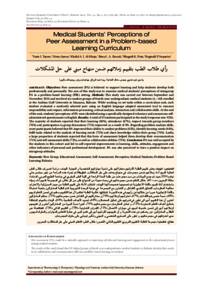Document
The Impact of small group case-based learning on traditional pharmacology teaching.
Other titles
أثر التعلم المبني على الحالات السريرية في مجموعات صغيرة لتدريس علم الأدوية على الطريقة التقليدية
Publisher
College of Medicine, Sultan Qaboos University.
Gregorian
2013-02
Language
English
English abstract
Objectives: This study aimed to measure medical students' perceptions of incorporating small group
case-based learning (CBL) in traditional pharmacology lectures. Methods: Data were collected from third-year
students (N = 68; 57% males, 43% females) at Al Quds University Medical School, Palestine. The students were
offered a CBL-incorporated Pharmacology-2 course after they had been taught Pharmacology-1 in the traditional
format during the preceding semester. Student attitudes towards the restructured course were examined by a
self-administered structured questionnaire. Results: The majority of students thought that CBL was an effective
learning tool for them (82%) and that it improved their learning skills (83%), independent learning skills (74%),
analytical skills (70%), and their level of preparation for exams (75%). Most students reported that team discussions
addressed lecture objectives (84%). Regarding cases discussed, most responders said that the cases were appropriate
to the lecture topics (96%) and that the time allocated for case discussion was sufficient (86%). A large proportion
of students thought that CBL improved their communication and collaborative skills (68% and 80%, respectively)
and ability to work within a team (79%). Conclusion: Pharmacology-2 course restructuring led to a significant
improvement of self-reported student satisfaction, motivation, and engagement.
Sponsorship
Sultan Qaboos University
Member of
Resource URL
Citation
Tayem, Yasin I. (2013). The impact of small group case-based learning on traditional pharmacology teaching. Sultan Qaboos University Medical Journal, 13 (1), 115-120..
Arabic abstract
الهدف: تهدف هذه الدراسة إلى قياس مدى رضا طلبة الطب عن استخدام التعلم في مجموعات صغيرة المبني على الحالات السريرية في مساق المحاضرات التقليدية لعلم الأدوية. الطريقة: تم جمع البيانات من طلبة السنة الثالثة في كلية الطب بجامعة القدس، فلسطين (عدد= 68، 57% ذكور، 43% إناث) تم عرض تدريس الطلاب مساق علم الأدوية - 2 على طريقة مكونة من العمل ضمن مجموعات صغيرة بعدما قام الطلاب بدراسة مساق علم الأدوية - 1 بالطريقة التقليدية خلال الفصل الدراسي السابق. تم استخدام استبانه تعبأ ذاتيا لمعرفة رأي الطلبة في البرامج المعاد هيكلتها .النتائج: غالبية الطلبة اعتقدوا أن الطريقة الجديدة كانت أداة تعليمية فعالة بالنسبة لهم (82%) وأنها حسنت مهاراتهم التعليمية (83%)، مهارات التعلم الذاتي (74%)، مهاراتهم التحليلية (70%) ومستوى التحضير للامتحانات (75%). ذكر معظم الطلبة أن نقاش الحالات السريرية قد تمحور حول أهداف المحاضرات (%84).بالنسبة للحالات السريرية قال معظم الطلبة أنها كانت ملائمة لمواضيع المحاضرات (96%) وبأن الوقت المخصص لمناقشتها كان كافيا (86%). اعتقد غالبية المستطلعة آراؤهم أن الأسلوب الجديد قد ساهم في تحسين مهارات الاتصال لديهم (68%) ورغبتهم في مساعدة زملاؤهم في المجموعة (80%) وقدرتهم على العمل بروح الفريق الواحد (79%). الخلاصة: إعادة هيكلة مساق علم الأدوية -2 أدى إلى تحسن هام في الرضا الذاتي للطلبة وكذلك تحمسهم واندماجهم في العملية التعليمية.
Category
Journal articles


